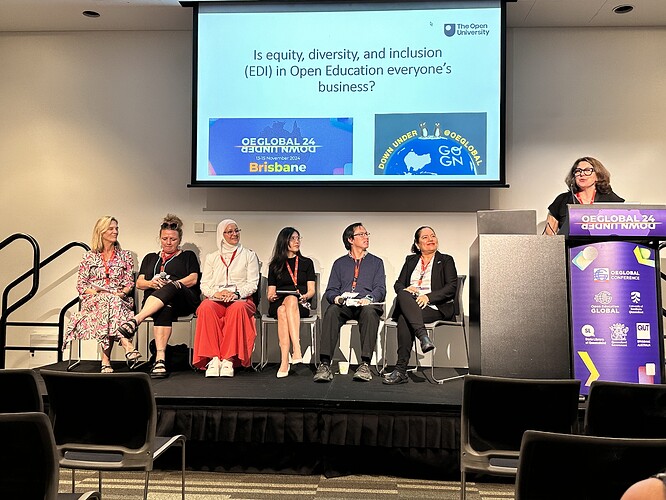Is equity, diversity, and inclusion (EDI) in Open Education everyone’s business? [ID 107]
Equity, diversity, and inclusion (EDI) have been a significant topic within the Open Education (OE) community. However, the provision of free and online resources, such as Open Educational Resources (OER), does not guarantee that access to these open resources is equitable, diverse, and inclusive. The vast majority of OER is only available in the English language, which makes it difficult for many learners worldwide to access them, in particular learners in the Global South. This is just an example that openness might not necessarily reach everyone and that more work is needed to ensure that open is equitable, diverse and inclusive (Bossu, et al., 2023; Iniesto & Bossu, 2023).
Other instances where EDI in OE might not be applicable or appropriate for everyone: • Resistance to change – as not everyone may be open to embracing EDI principles and practices. Individuals or institutions with entrenched biases or outdated beliefs may resist efforts to promote diversity and inclusion in open education. • Cultural beliefs - cultural differences and norms can influence the acceptance and implementation of openness. Some communities or institutions may have cultural traditions or beliefs that need to be respected, but also clash with certain aspects of openness, posing challenges to its widespread adoption. • Lack of awareness - some open practitioners may not fully grasp the importance of EDI or may be unaware of the impact of systemic inequalities on marginalized groups. This lack of awareness can impede efforts to promote EDI across all educational contexts, in particular in open education.
While promoting EDI in open education is critical for fostering a more inclusive and equitable open learning environment, it is essential to recognise that there may be limitations and challenges that hinder its universal applicability. Addressing these barriers and engaging in thoughtful, context-specific discussions and strategies can help ensure that EDI initiatives are relevant and effective.
This panel aims to provide a venue for these discussions to take place. Distinguished speakers from various backgrounds and from different regions of the world, including from South America, Asia, and Africa, will shed light on the impact of EDI practices in promoting access and participation in open education. Through sharing research, case studies, and best practices, the panellists will provide valuable insights on how to create more inclusive learning environments and resources. Panel attendees can expect to engage in thought-provoking discussions and gain practical strategies for advancing EDI in the field of open education.
References
Iniesto, F., & Bossu, C. (2023). Equity, diversity, and inclusion in open education: A systematic literature review. Distance Education, 44(4), 694–711. https://doi.org/10.1080/01587919.2023.2267472
Bossu, C.; Iniesto, F.; Vladimirschi, V.; Jordan, K. & Pete, J. (2023). GO-GN Guidelines for Equity Diversity and Inclusion in Open Education with a focus on Africa and Latin America. Global OER Graduate Network. GO-GN EDI Guidelines |
Author Keywords
EDI, Equity diversity and inclusion in Open Education, EDI guidelines, EDI strategies for open education
Session Details
![]() Format: Panel Discussion
Format: Panel Discussion
![]() Presenter(s): Carina Bossu, Francisco Iniesto Carrasco
Presenter(s): Carina Bossu, Francisco Iniesto Carrasco
![]() Brisbane Time: November 13, 4:00 PM → 5:00 PM AEST
Brisbane Time: November 13, 4:00 PM → 5:00 PM AEST
![]() Your Local Time: →
Your Local Time: →
![]() Room: P4
Room: P4
![]() Topic Area: Diversity Equity and Inclusion
Topic Area: Diversity Equity and Inclusion
![]() Sched: View in conference schedule
Sched: View in conference schedule
Participate
Use this space to:
- Ask questions of the presenters
- Share related resources
- Continue discussions from the session
- Braid/connect with other sessions
